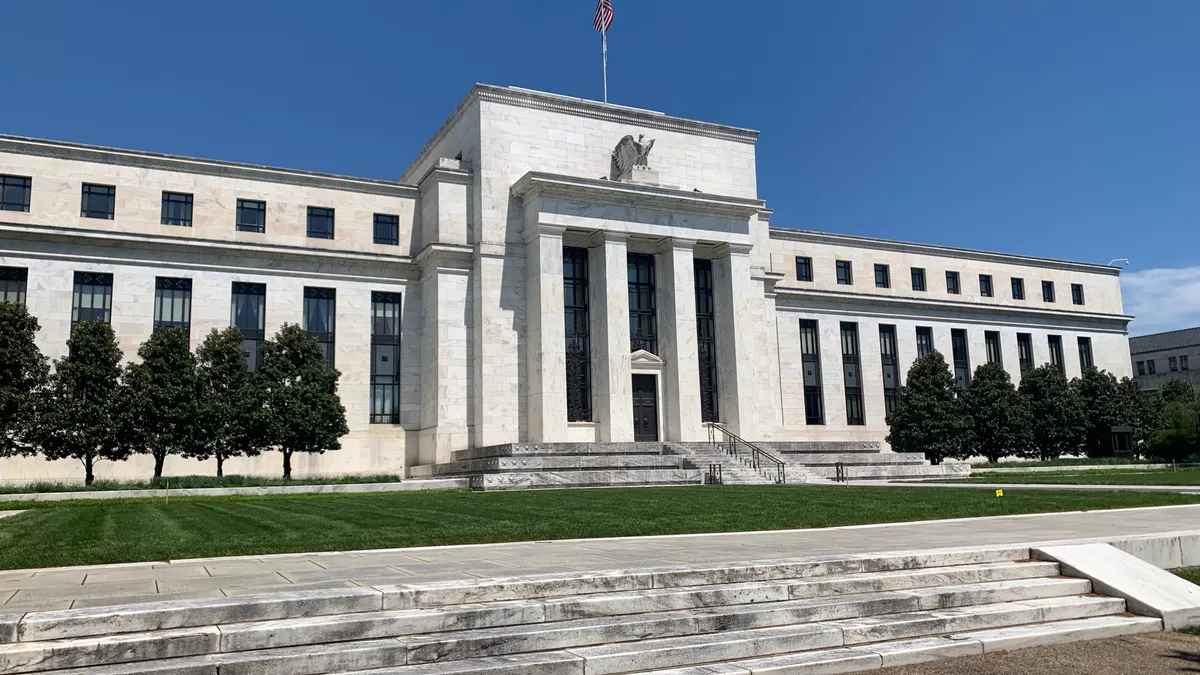Dive Brief:
- The Federal Reserve on Friday lowered for a third time — to $100,000 — the minimum threshold of loans available through the Main Street Lending Program.
- The central bank is waiving the 1% fee it collects from borrowers on loans of less than $250,000, but it will allow banks to double — to 2% — the origination fees they can charge borrowers of loans that size, according to The Wall Street Journal.
- Borrowers calculating their eligibility to apply for the Main Street program can exclude from their debt Paycheck Protection Program (PPP) loans of less than $2 million, as long as they're expected to be forgiven, the Fed clarified Friday.
Dive Insight:
Friday's tweaks to Main Street eligibility come as the likelihood of congressional consensus on a new pandemic stimulus bill — and hence a PPP revival — wanes.
Since its launch in June, the Main Street program has suffered relatively low demand. About 400 loans totaling $3.7 billion have been made through the $600 billion facility, the Fed said Friday. The program is set to expire Dec. 31 unless the Fed and Treasury Department extend it.
Lawmakers and advocacy groups, in a September congressional hearing, suggested the Fed reduce the loan threshold, or increase the share of each Main Street loan the central bank would purchase from 95% to 100%. The Fed on Friday did not change that figure, leaving lenders on the hook for 5% of each loan they service through the program.
In September, Fed Chairman Jerome Powell resisted calls to reduce the loan threshold, which originally stood at $1 million, but was cut to $500,000, and then to $250,000. "The current facility would not work for much smaller loans," Powell said at the time. "We'd have to start a new facility that had much less protection for the taxpayer."
About 14% of Main Street loans, as of Sept. 30, were less than $1 million, Bloomberg reported — lending credence to an argument that fiddling with the low end of the loan threshold may not boost demand for the program. Detractors have said eligible businesses — those with 15,000 or fewer employees or less than $5 billion in annual revenue — have simply found other loan vehicles to meet their needs.
"Trying to underwrite the credit of hundreds of thousands of small businesses would be very difficult," Powell told lawmakers in September. "I think PPP is a better way to address that space in the market."
With PPP stalled, the Fed played with Main Street's margins. The Fed, through its special-purpose vehicle, agreed to pay lenders 50 basis points per year for servicing loans less than $250,000.
Other concessions the program's architects have made since launch have failed to catch on. The vehicle expanded to nonprofit organizations in July, but as of Sept. 30, no nonprofit borrowers had taken advantage, Reuters reported, citing Fed documents.
"This is a major victory in our push to give small businesses the tools they need to get through the pandemic," Rep. Donna Shalala, D-FL, said in a statement Friday. "This is a great first step, but there's definitely more work to be done. We're going to keep pressing for more oversight and accountability."














